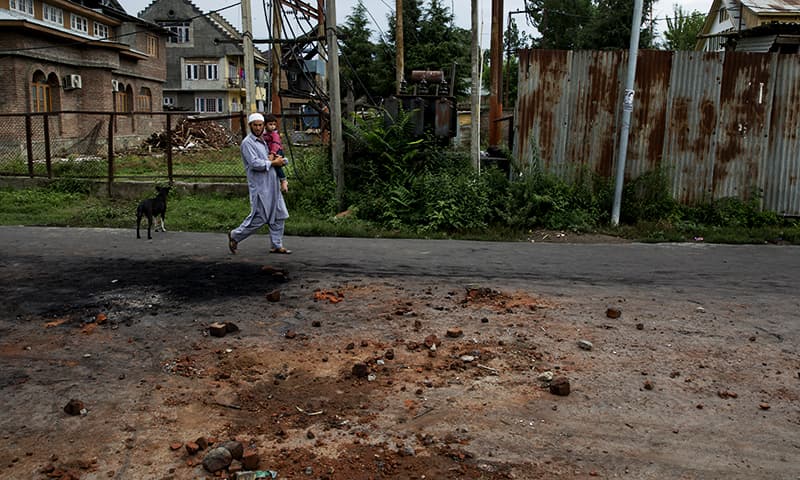Indian authorities reimposed restrictions on movement in major parts of occupied Kashmir's biggest city, Srinagar, on Sunday after violent overnight clashes between residents and police in which dozens were injured, two senior officials and eyewitnesses said.
In the past 24 hours, there has been a series of protests against New Delhi's August 5 revocation of the occupied region's autonomy. This followed an easing in curbs on movement on Saturday morning.

The state government has said that it has not imposed a curfew over the past two weeks, but on Sunday people were being turned back at multiple roadblocks set up in the city in the past few hours. Security forces at some roadblocks have told residents there is a curfew.
Two senior government officials told Reuters that at least two dozen people were admitted to hospitals with pellet injuries after violent clashes broke out in the old city on Saturday night.
Explore: Will the pellet gun victims in Kashmir ever regain their eyesight?
Representatives in the occupied Jammu and Kashmir government in Srinagar and the federal government in New Delhi did not immediately return calls asking about the latest clampdown or seeking an assessment of the number of injuries and clashes.
One of the official sources said that people pelted security forces with stones in around two dozen places across Srinagar. He said that the intensity of the stone pelting protests has increased over the past few days.
Chilli grenades
The heavy overnight clashes took place mostly in Rainawari, Nowhetta and Gojwara areas of the old city where Indian troops fired tear gas, chilli grenades and pellet guns to disperse protesters, eyewitnesses and officials said.

Chilli grenades contain very spicy chili pepper, and produce a major eye and skin irritant, as well as a pungent smell, when they are unleashed.
The officials, who declined to be identified because they aren't supposed to talk to the media, said clashes also took place in other parts of the city including Soura, a hotbed of protests in the past two weeks.
Read more: How Modi used Kashmir to stoke nationalist sentiment and woo India's Hindu voters
A senior government official and hospital authorities at Srinagar's main hospital said that at least 17 people came there with pellet injuries. They said 12 were discharged while five with grievous injuries were admitted.
The hospital officials and a police officer told Reuters that a 65-year-old man, Mohammad Ayub of Braripora, was admitted to the hospital after he had major breathing difficulties when tear gas and chilli grenades were fired in old city area on Saturday afternoon. He died in the hospital on Saturday night and has already been buried, they said.
Blocking the way
Javed Ahmad, age 35 and from the wealthy Rajbagh area of Srinagar, was prevented from going to the old city early on Sunday morning by paramilitary police at a barricade near the city centre.
"I had to visit my parents there. Troops had blocked the road with concertina wire. They asked me to go back as there was curfew in the area," he said.
Telephone landlines were restored in parts of the city on Saturday after a 12-day blackout and the state government said most telephone exchanges in the region would start working by Sunday evening. Internet and cellphones remain blocked in occupied Kashmir.

More than 500 political or community leaders and activists remained in detention, and some have been flown to prisons outside the state.
Read more: Kashmiris warn India its crackdown is turning some to militancy
For 30 years in occupied Kashmir, India has been fighting a revolt in which at least 50,000 people have been killed. Critics say the decision to revoke autonomy will cause further alienation and fuel the armed resistance.
The change will allow non-residents to buy property in occupied Kashmir and end the practice of reserving state government jobs for local residents.
Indian Prime Minister Narendra Modi's government claims the measure is necessary to integrate occupied Kashmir fully into India and speed up its development.



















































